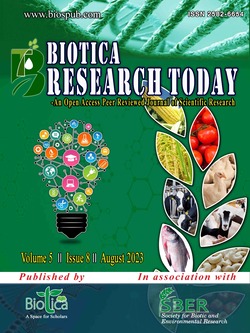
Role of Plant Growth Promoting Rhizobacteria in Combating Abiotic Stress in Crops
Eashan Mukherjee*
Dept. of Genetics and Plant Breeding, College of Agriculture, Chaudhary Charan Singh Haryana Agricultural University, Hisar, Haryana (125 004), India
DOI: NIL
Keywords: Abiotic stress, Phytoremediation, Plant growth promoting rhizo-bacteria, Stress tolerance
Abstract
The diverse assemblage of plant growth-promoting rhizobacteria (PGPRs) existing in the rhizosphere can contribute towards the improvement in the magnitude or essence of plant development both directly as well as indirectly. Direct impacts engross the generation of phyto primary metabolites such as auxins, gibberellic acids (GA) and cytokinins (CKs), while indirect effects include disease suppression via antibiotic production. Under direful environmental anomalies such as water scarcity, excess water and salinity, metallic toxicities and temperature extremes, the PGPRs contribute significantly in attenuating the plant stress. The detrimental effects of salinity and metal toxicity could be diminished through PGPR mediated phytoremediation which is projected to be fruitful in soils afflicted with high salt and heavy metal contents. Thus, the current article highlights the activities of PGPRs and their employment in discounting the inapt effects of abiotic detriments on crop plants.
Downloads
not found
Reference
Chang, P., Gerhardt, K.E., Huang, X.D., Yu, X.M., Glick, B.R., Gerwing, P.D., Greenberg, B.M., 2014. Plant growth-promoting bacteria facilitate the growth of barley and oats in salt-impacted soil: Implications for phytoremediation of saline soils. International Journal of Phytoremediation 16(11), 1133-1147. DOI: https://doi.org/10.1080/15226514.2013.821447.
Fahad, S., Hussain, S., Bano, A., Saud, S., Hassan, S., Shan, D., Khan, F.A., Khan, F., Chen, Y., Wu, C., Tabassum, M.A., Chun, M.X., Afzal, M., Jan, A., Jan, M.T., Huang, J., 2015. Potential role of phytohormones and plant growth-promoting rhizobacteria in abiotic stresses: Consequences for changing environment. Environmental Science and Pollution Research 22, 4907-4921. DOI: https://doi.org/10.1007/s11356-014-3754-2.
Goswami, M., Deka, S., 2020. Plant growth-promoting rhizobacteria-alleviators of abiotic stresses in soil: A review. Pedosphere 30(1), 40-61. DOI: https://doi.org/10.1016/S1002-0160(19)60839-8.
Kumar, A., Patel, J.S., Meena, V.S., Ramteke, P.W., 2019. Plant growth-promoting rhizobacteria: Strategies to improve abiotic stresses under sustainable agriculture. Journal of Plant Nutrition 42(11-12), 1402-1415. DOI: https://doi.org/10.1080/01904167.2019.1616757.
